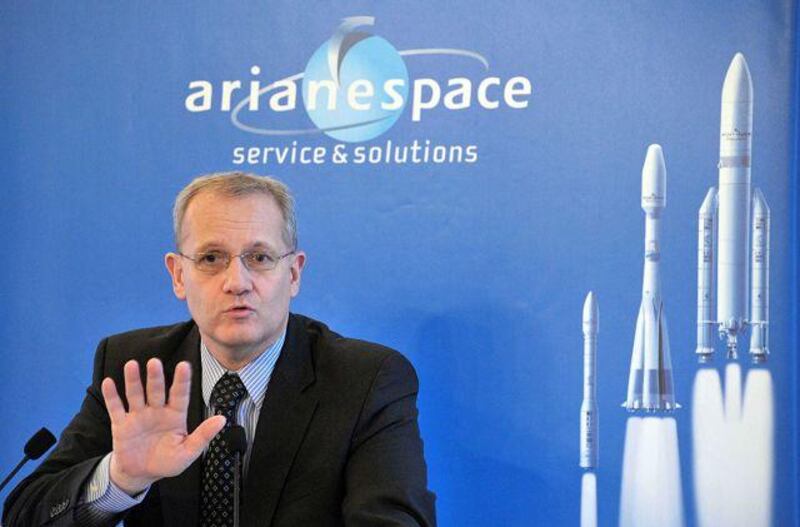Jean-Yves Le Gall, the chief executive and chairman of Arianespace, has focused on the business of space since witnessing the historic moon landing in 1969 as a child. On a July night in 1969, Jean-Yves Le Gall witnessed the live television broadcast of the first man walking on the moon. He was 10 at the time and decided that space would become his final frontier. Today, Mr Le Gall is the chairman and chief executive of Arianespace, which is based in France and is celebrating its 30th anniversary. The organisation he heads is arguably, after the US National Aeronautics and Space Administration (NASA), the biggest name in the space industry.
With 24 shareholders from 10 European countries, Arianespace has an arrangement with the European Space Agency to put commercial and government satellites into orbit from its launch site in French Guiana. Rehan Khan spoke with Mr Le Gall at the World Space Risk Forum 2010 in Dubai this month. Q What brought you to the World Space Risk Forum 2010 in Dubai? A Managing risk is at the heart of any space programme. In this business, you cannot offer 99.999 per cent. It will either succeed or it will fail. Providing the right insurance structure around the launch is critical. The business case cannot move without it. Therefore a forum such as this is important as it brings all of the major players in the business together. The insurance agents, space companies such as us, as well as our customers. Through this exchange of ideas we can develop more innovative solutions.
What message have you come to convey to your customers in the region? We have been here for 25 years and historically served the major telecommunications satellite players of the region. In total, we have launched 15 satellites for Middle East customers, which represent 65 per cent market share. In the UAE, we are actively working with Yahsat on civil and military deployments, as well as Arabsat. There are also potential newcomers such us Petrosat and SmartSat who are entering the market. The region is very buoyant, and we are committed to it as well as remaining a partner of trust to our customers by developing leading technologies for them.
Arianespace has won more than half the commercial launch contracts open to competition in the past two years. Why is that? We place the concern of our customers at the heart of our business. We always respect the launch date. And we have reliable launch vehicles such as the Ariane 5, Soyuz and Vega. Most of all, we do not just sell a rocket, we provide the entire service and solution to go with it as well as placing our staff in global centres close to our customers. Presently, we operate from Evry in France, Kourou in French Guiana, Washington DC, Singapore and Tokyo.
What is your assessment of the MENA region for your business? It is extremely dynamic. The first satellite to launch, 25 years ago, was Arabsat. Today, the region has many requirements fuelled by broadband, television and mobile. We enjoy the entrepreneurial approach that we see here. There are still a number of untapped locations across MENA and this makes it a strong growth market.
The business of space history is littered with commercial failures, what is the main reason for this? In space, there are two kinds of projects. Engineering-driven, which are new products looking for markets, or managerial-driven. This is based on delivering a product or service to fulfil demand. Our customers such as Yahsat are fulfilling an existing demand for television, broadband and other services.
Are you involved in sending civilians into space, through private commercial flights? No, this is not our business. Our customers are organisations that wish to send their payloads into space. Not their people. Has the global economic slowdown affected your business? The trend for us is still positive. For example, we are seeing demand for high-definition television going up. This requires more channels and uses more satellite capacity. That translates into more payloads. Also, 3D television is now emerging. At the football World Cup in South Africa this summer, 25 matches will be transmitted in 3D format.
If you were not working in the space industry, then what other profession would you have embarked on? I would probably be working for a non-profit organisation, helping others. As a matter of fact, this is what I plan to do when I retire. @Email:business@thenational.ae





